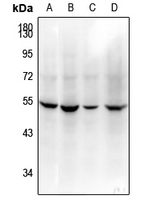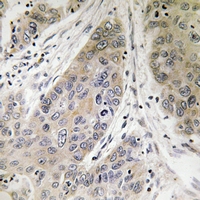Anti-CD208 Antibody
Rabbit polyclonal antibody to CD208
- SPECIFICATION
- CITATIONS
- PROTOCOLS
- BACKGROUND

Application
| WB, IHC |
|---|---|
| Primary Accession | Q9UQV4 |
| Other Accession | Q7TST5 |
| Reactivity | Human, Mouse, Rat |
| Host | Rabbit |
| Clonality | Polyclonal |
| Calculated MW | 44346 Da |
| Gene ID | 27074 |
|---|---|
| Other Names | DCLAMP; TSC403; Lysosome-associated membrane glycoprotein 3; LAMP-3; Lysosomal-associated membrane protein 3; DC-lysosome-associated membrane glycoprotein; DC LAMP; Protein TSC403; CD208 |
| Target/Specificity | KLH-conjugated synthetic peptide encompassing a sequence within the center region of human CD208. The exact sequence is proprietary. |
| Dilution | WB~~WB (1/500 - 1/1000), IH (1/50 - 1/200) IHC~~1:100~500 |
| Format | Liquid in 0.42% Potassium phosphate, 0.87% Sodium chloride, pH 7.3, 30% glycerol, and 0.09% (W/V) sodium azide. |
| Storage | Store at -20 °C.Stable for 12 months from date of receipt |
| Name | LAMP3 |
|---|---|
| Synonyms | DCLAMP, TSC403 |
| Function | Lysosomal membrane glycoprotein which plays a role in the unfolded protein response (UPR) that contributes to protein degradation and cell survival during proteasomal dysfunction (PubMed:25681212). Plays a role in the process of fusion of the lysosome with the autophagosome, thereby modulating the autophagic process (PubMed:24434718). Promotes hepatocellular lipogenesis through activation of the PI3K/Akt pathway (PubMed:29056532). May also play a role in dendritic cell function and in adaptive immunity (PubMed:9768752). |
| Cellular Location | Cell surface. Lysosome membrane; Single-pass type I membrane protein. Cytoplasmic vesicle membrane; Single-pass type I membrane protein. Early endosome membrane; Single-pass type I membrane protein. Note=During dendritic cell maturation, detected on cytoplasmic vesicles (the MHC II compartment) that contain MHC II proteins, LAMP1, LAMP2 and LAMP3 (PubMed:9768752). Detected on lysosomes in mature dendritic cells (PubMed:9768752). |
| Tissue Location | Detected in tonsil interdigitating dendritic cells, in spleen, lymph node, Peyer's patches in the small instestine, in thymus medulla and in B-cells (at protein level). Expressed in lymphoid organs and dendritic cells. Expressed in lung. Up-regulated in carcinomas of the esophagus, colon, rectum, ureter, stomach, breast, fallopian tube, thyroid and parotid tissues |

Thousands of laboratories across the world have published research that depended on the performance of antibodies from Abcepta to advance their research. Check out links to articles that cite our products in major peer-reviewed journals, organized by research category.
info@abcepta.com, and receive a free "I Love Antibodies" mug.
Provided below are standard protocols that you may find useful for product applications.
Background
KLH-conjugated synthetic peptide encompassing a sequence within the center region of human CD208. The exact sequence is proprietary.
If you have used an Abcepta product and would like to share how it has performed, please click on the "Submit Review" button and provide the requested information. Our staff will examine and post your review and contact you if needed.
If you have any additional inquiries please email technical services at tech@abcepta.com.













 Foundational characteristics of cancer include proliferation, angiogenesis, migration, evasion of apoptosis, and cellular immortality. Find key markers for these cellular processes and antibodies to detect them.
Foundational characteristics of cancer include proliferation, angiogenesis, migration, evasion of apoptosis, and cellular immortality. Find key markers for these cellular processes and antibodies to detect them. The SUMOplot™ Analysis Program predicts and scores sumoylation sites in your protein. SUMOylation is a post-translational modification involved in various cellular processes, such as nuclear-cytosolic transport, transcriptional regulation, apoptosis, protein stability, response to stress, and progression through the cell cycle.
The SUMOplot™ Analysis Program predicts and scores sumoylation sites in your protein. SUMOylation is a post-translational modification involved in various cellular processes, such as nuclear-cytosolic transport, transcriptional regulation, apoptosis, protein stability, response to stress, and progression through the cell cycle. The Autophagy Receptor Motif Plotter predicts and scores autophagy receptor binding sites in your protein. Identifying proteins connected to this pathway is critical to understanding the role of autophagy in physiological as well as pathological processes such as development, differentiation, neurodegenerative diseases, stress, infection, and cancer.
The Autophagy Receptor Motif Plotter predicts and scores autophagy receptor binding sites in your protein. Identifying proteins connected to this pathway is critical to understanding the role of autophagy in physiological as well as pathological processes such as development, differentiation, neurodegenerative diseases, stress, infection, and cancer.



